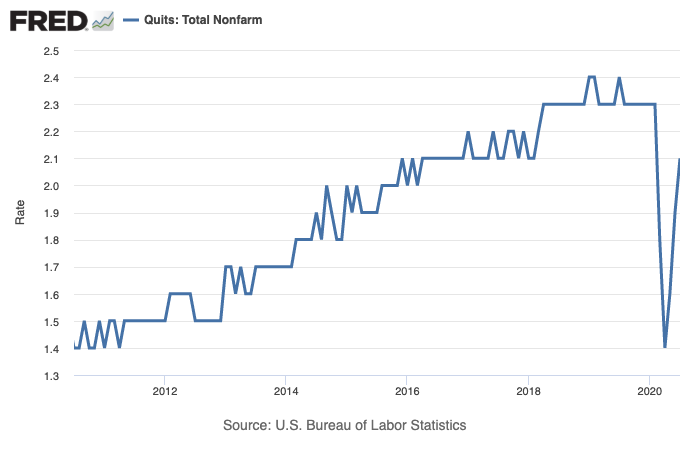Job openings increasing, but not yet enough 'to dig ourselves out of an extraordinary hole'
In a positive sign for the economy, the number of job openings increased again in July.
But other factors may be signaling that the recovery is slowing down.
Job openings increased by 617,000 in July to 6.6 million, according to the Labor Department’s Job Openings and Labor Turnover Survey (JOLTS) released Wednesday. Sectors that saw the biggest increase in job openings included retail trade, which added 172,000 new positions, and education and health services, which added 173,000 jobs.

The number of unemployed workers per job opening also fell to 2.5 in July. While still very high, that number also includes people who are waiting to be recalled. The actual ratio of jobless searchers to open jobs is around 1.4, according to Nick Bunker, economic research director for the Indeed Hiring Lab.
“It is overall a positive number,” Bunker told Yahoo Money. “But it's very conditional on the economic damage from the virus not spreading too much further.”
At the same time, sectors like accommodation and food services — disproportionately hit by the pandemic and ensuing recession — saw a drop in job openings of 62,000, potentially signaling a rise in permanent layoffs in that sector.
“Directionally that's not a good thing,” Ernie Tedeschi, a managing director, and policy economist for Evercore ISI told Yahoo Money. “I worry that a sign that some businesses in accommodation and food services may be closing may be giving up on hiring back certain workers.”

‘We're also trying to dig ourselves out of an extraordinary hole’
Hiring also waned in July compared with June, down by 1.2 million to 5.8 million for the month.
And while the July hiring rate of 4.1% is higher than its pre-pandemic levels, it’s still concerning given the economy lost 22 million jobs between February and April, according to Tedeschi.
“They're high numbers by any sort of normal circumstances,” he noted, “but we're also trying to dig ourselves out of an extraordinary hole.”
Layoffs continued to decline in July, totaling 1.7 million after peaking at 11.5 million in April, another positive sign from the report. But for the current phase of economic recovery, the speed of hiring is a more important indicator, according to Tedeschi.

Read more: Here’s what you need to know about unemployment benefits eligibility
Less than half of those jobs lost in the pandemic have been recovered through August. But that leaves at least 11 million more jobs to make up for the spring losses, not to mention any job growth that would have occurred if the pandemic never happened.
“The JOLTS data is still elevated from where it was pre-COVID, but it’s decelerating,” Tedeschi said. “It’s like a car that’s going fast, trying to get up a mountain and it’s only gotten halfway up, and it’s already slowing down.”
More people are quitting their jobs
More workers quit their jobs in July — with the rate increasing to 2.1% from 1.9% — typically a sign of confidence in the labor market. For instance, the quit rate increased as the economy recovered from the Great Recession.

“I think that that's positive,” Tedeschi said. “If you are willingly quitting your job, you either have a job lined up for yourself, somewhere else, or you're financially secure enough that you feel comfortable quitting your job.”
But this recession is occurring at the same time as a public health crisis, so workers may be quitting not to get a better-paying job, but to accommodate their children’s remote schooling or health concerns.
“It may be not just for the traditional reasons like making more money,” Bunker said, “but it could be due to health concerns or movements to out of the workforce.”
Denitsa is a writer for Yahoo Finance and Cashay, a new personal finance website. Follow her on Twitter @denitsa_tsekova.
Read more:
New unemployment requirements make it tougher for workers to qualify
Even as GDP tanked, personal income grew thanks to government support
Read more personal finance information, news, and tips on Cashay
Follow Yahoo Finance on Twitter, Facebook, Instagram, Flipboard, SmartNews, LinkedIn, YouTube, and Reddit.

 money
money 
